 Petzlover
Petzlover Pixie-bob is originated from United States but Siberian is originated from Russia. Both Pixie-bob and Siberian are having almost same weight. Pixie-bob may live 3 years less than Siberian. Both Pixie-bob and Siberian has same litter size. Pixie-bob requires Low Maintenance. But Siberian requires Moderate Maintenance
Pixie-bob is originated from United States but Siberian is originated from Russia. Both Pixie-bob and Siberian are having almost same weight. Pixie-bob may live 3 years less than Siberian. Both Pixie-bob and Siberian has same litter size. Pixie-bob requires Low Maintenance. But Siberian requires Moderate Maintenance
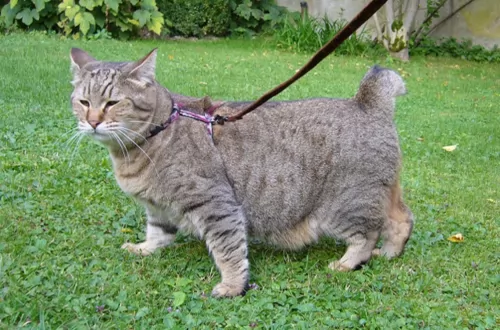 The Pixie-Bob breed is thought to have started from the unplanned litter of a bobcat and a barn cat in 1985. The whole idea of the Pixie-Bob was to get a cat that resembled the North American Bobcat.
The Pixie-Bob breed is thought to have started from the unplanned litter of a bobcat and a barn cat in 1985. The whole idea of the Pixie-Bob was to get a cat that resembled the North American Bobcat.
The barn cat belonged to Carol Ann Brewer, and she named a female kitten Pixie. Pixie became the foundation mother for this breed.
In fact, it was in 1989 that she wrote the first breed standard, naming the breed Pixiebob, in honor of Pixie. In 1998, the Pixiebob achieved TICA championship status. Today, the International Cat Association (TICA) recognizes the Pixie-Bob as a breed.
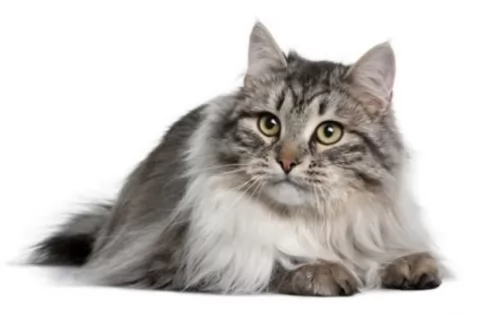 The beautiful Siberian cat originated from Russia, a very cold area which explains his thick coat.
The beautiful Siberian cat originated from Russia, a very cold area which explains his thick coat.
This is a natural variety of domestic cat. It is an ancient breed and it is believed that it is ancestral to all modern long-haired cats.
The Siberian is the national cat of Russia. The cat first arrived in the United States in 1990.
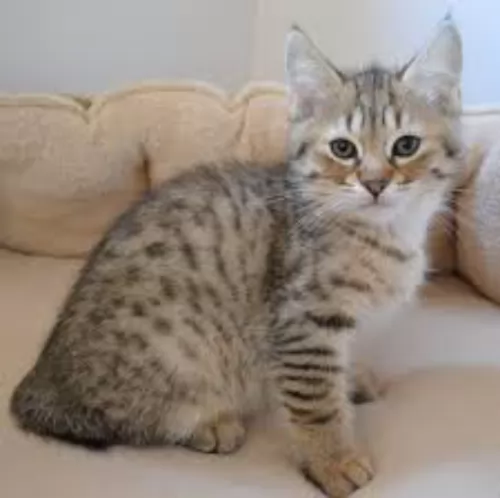 The Pixie-Bob is a medium to large cat that can weigh up to about 8kg. They stand between 25 and 33cm in height.
The Pixie-Bob is a medium to large cat that can weigh up to about 8kg. They stand between 25 and 33cm in height.
It's a muscular cat. These cats have a thick double coat which can be short-haired or long-haired. Most times they have a striped coat pattern with some rosettes. In fact, the pattern on the fur is much like that of a Bobcat.
Their eyes are triangular shaped and they have quite a distinctive heavy brow. The eyes are usually a honey color or they can be green. The tail is rumpy or non-existent or it can be a few inches in length. Sometimes the ears will have some feathering at the tips.
They are polydactyl which means that with their paws, they have more than the regular number of digits.
In spite of there being a wild side to this coat, they are amicable, fairly laid-back type of cats. Pixie-Bobs enjoy being with their owners, loving to quietly spend time with their human beings.
They’re not cats that form a strong bond with just one family member, but they are friendly with everyone in the family. When a stranger calls, they may run off however, to hide in a safe spot.
Some people describe them as dog-like. These cats also have a love for water so don’t be surprised if you see him spending a lot of time playing around his water bowl. This is a cat that just loves being the center of everything that is going on, and yet he has a calm aura about him.
The Pixiebob is talkative, chirping and chattering away as he tells you about what he has got up to during the day.
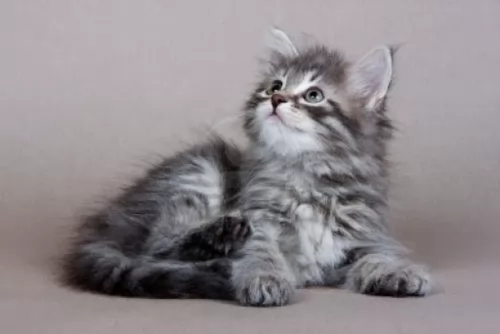 The Siberian is a medium to large-sized cat that weighs between 3 and 7kg. They are known to be excellent jumpers.
The Siberian is a medium to large-sized cat that weighs between 3 and 7kg. They are known to be excellent jumpers.
It is a powerfully built cat with large paws and a full tail. The ears are medium in size with large round eyes. The cat has a slight arch to its back as the hind legs are a bit longer than the front legs.
The glossy coat is in three layers to protect it from extreme weather conditions. It comes in different colors such as tortoiseshell, colorpoint, tabby, and solid. He sheds a couple of times a year.
The Siberian cat is highly affectionate with family and playful too. In spite of that, he also loves curling up close to where his humans are.
This friendly cat will want to follow you and be where you are. They’re intelligent and can be taught a few tricks. Because they’re athletic, it will be a good idea to buy him a climbing tree as he loves to leap up to a perch and watch things going on. He gets on well with children and other pets.
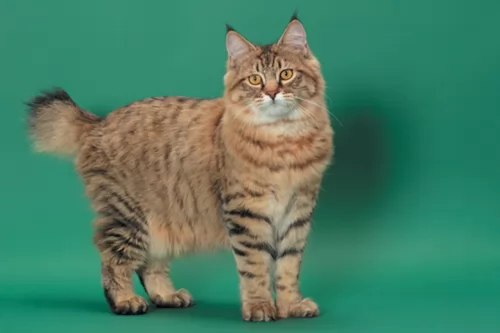 The Pixie-Bob just loves being around his human family and he forms strong bonds with them.
The Pixie-Bob just loves being around his human family and he forms strong bonds with them.
They are social cats and like a dog, they try to become involved in the going-on of the family. By treating this cat well and providing him with a loving home, he is capable of making you a most amicable and energetic member of the family.
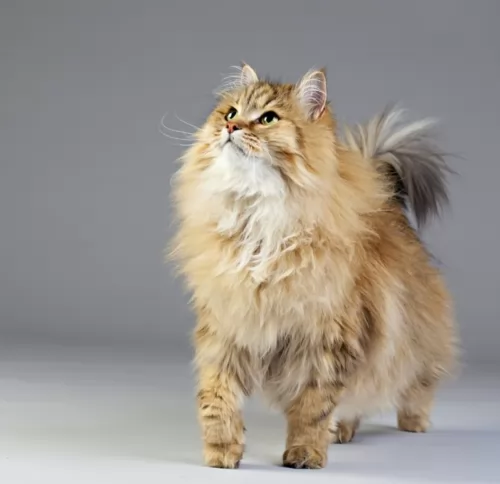 Your Siberian loves to climb and explore and to keep this gorgeous cat mentally stimulated and physically active, provide him with some fun toys that require him to think.
Your Siberian loves to climb and explore and to keep this gorgeous cat mentally stimulated and physically active, provide him with some fun toys that require him to think.
They are nice and strong these cats as well as being curious and alert and you see this in the bright, shiny eyes.
They’ve got easygoing personalities and are also considered fairly low maintenance cats, making them the perfect choice for any cat lover.
They are devoted and loyal to their human family and one of these cats in your home is guaranteed to bring in joy, entertainment, fun, and solid companionship.
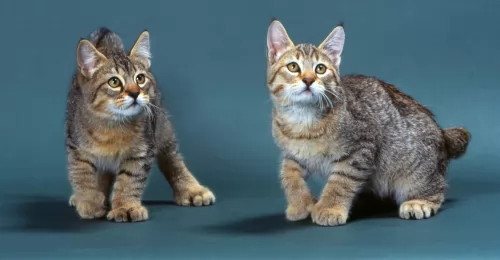 These are healthy cats and they don’t easily get sick. There are always some cat health issues that can crop up with any cat, and with the Pixie Bob, they seem to battle with delivering litters.
These are healthy cats and they don’t easily get sick. There are always some cat health issues that can crop up with any cat, and with the Pixie Bob, they seem to battle with delivering litters.
Sometimes you will hear of Cryptorchidism in these cats which means there is the absence of the testes or scrotum.
Whatever health issues your cat has, always make sure that you get him to the vet for his immunizations as well as for check-ups.
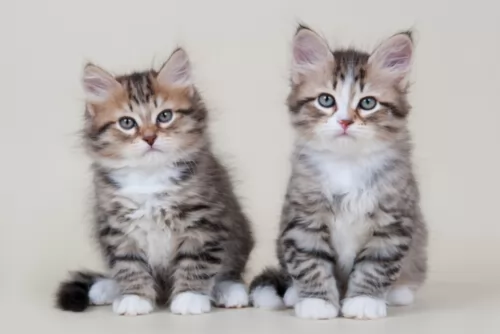 Siberian cats can succumb to stomach issues such as IBS. If you think your Siberian is in pain, he will need a visit to the vet. These cats are also susceptible to some hereditary health issues such as hypertrophic cardiomyopathy. If you buy a kitten, make sure you get your kitten from a reputable source.
Siberian cats can succumb to stomach issues such as IBS. If you think your Siberian is in pain, he will need a visit to the vet. These cats are also susceptible to some hereditary health issues such as hypertrophic cardiomyopathy. If you buy a kitten, make sure you get your kitten from a reputable source.
To ensure the best health for your Siberian, he will need high-quality cat food. High-quality food can actually prevent many health issues in the cat. A good idea will be to feed your Siberian vet-recommended food and in the right portions to keep him at the ideal weight.
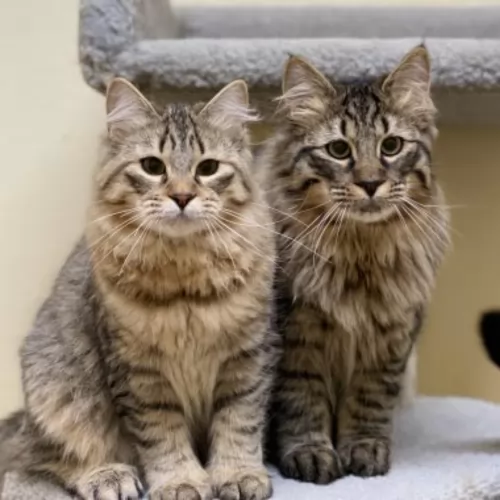 Pixie-bobs don’t require any special diet. When it comes to commercially manufactured cat foods, there are wet foods, dry foods and combination foods. You’ll find out what your cat likes, but remember that a cat is a carnivore and that meat is what they eat.
Pixie-bobs don’t require any special diet. When it comes to commercially manufactured cat foods, there are wet foods, dry foods and combination foods. You’ll find out what your cat likes, but remember that a cat is a carnivore and that meat is what they eat.
Always go for high-quality foods if you are able to because the best foods are better able to keep your cat healthy. The nutritional needs of a cat change as he grows and matures and there are cat foods specially manufactured for every season of your Pixie-Bob’s life.
Always ensure that there is a bowl of clean, fresh, cool water available to your cat.
The short hair of the Pixie-Bob means that it will be easy to give your cat a brush once a week to remove loose hairs.
Always get your cat to the vet when he shows signs of illness. If he comes to you as a kitten he will need his vaccinations as well as worm medicine. Your vet will inform you when to bring you cat in for the next round of vaccinations.
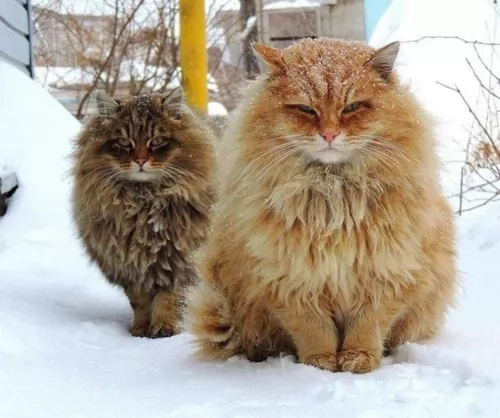 Prepare your home for the arrival of your Siberian cat. Cats are natural climbers and scratchers and he will need a scratching post, climbing tree, litter box, food and water bowls, bed as well as collar and tag. Also, invest in a large cat carrier, as your cat will need to be transported safely to the vet at certain times.
Prepare your home for the arrival of your Siberian cat. Cats are natural climbers and scratchers and he will need a scratching post, climbing tree, litter box, food and water bowls, bed as well as collar and tag. Also, invest in a large cat carrier, as your cat will need to be transported safely to the vet at certain times.
Provide toys for your Siberian cat. They’re intelligent and you don’t want to have him bored and listless. They need mental and physical stimulation so it will be fun to invest in some puzzle games for your pet.
Siberians have lovely thick coats and you want the right grooming accessories to brush him so that the coat doesn’t get dull and tangled. He will need to be brushed once or twice a week, especially when he sheds.
Keep your Siberian healthy by seeing he gets to the vet when he is sick. Also, if he is a kitten, he will need his vaccines. He will need to be checked over for parasites too – ticks, fleas, and worms, more so if he is an outdoor cat.
Trim your Siberian's nails as needed and also check the inside of his ears for signs of redness, dirt, and wax buildup as well as unpleasant odors. Many cat owners don’t like to probe around inside a cat’s ears as it can be damaging if you don’t know what you’re doing. Rather ask your vet to do it for you.
The vet can also check your cat’s teeth for signs of infection. Many people recommend cleaning the cat's teeth with a brush and cat toothpaste but this can be most traumatic for a cat and your pet groomer or vet can rather check his teeth for you.